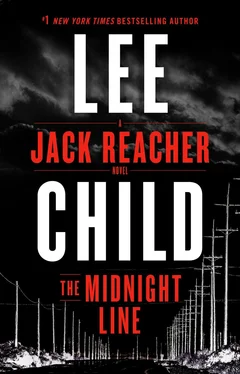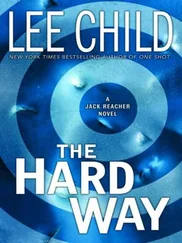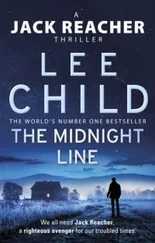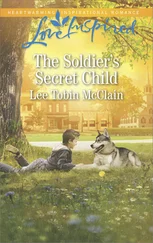Reacher and Bramall and Mackenzie went to meet them. They all stopped, six people, groups of three, five polite feet apart.
The guy in the boots said, “Just Mrs. Mackenzie.”
Reacher waited.
Mackenzie said, “No, all three of us.”
The guy said nothing.
Reacher waited again. For their plan B. He knew they had one. Stupid to come without.
The guy said, “OK.”
He turned and walked back and the three of them climbed in their crew-cab again. Bramall and Mackenzie and Reacher climbed in the Toyota. The crew-cab backed up and turned, and drove away west. Bramall followed, hanging back, drifting left, drifting right, trying to miss the worst of the dust.
—
The crew-cab turned in on the second track on the right. Bramall followed. The track was wide, but the surface was bad. Roots, rocks, gravel. Up ahead the crew-cab bucked and bounced. Its tires chirped and slid on stones worn smooth by time. There were trees left and right, mostly conifers, some gnarled by the wind, some stately. There were distant blazes of gold, mostly in the gulches and the gullies, where the aspen was happiest. The track went left and right, around trees, around rocks the size of cars, some of them piled high on top of each other, some of them overhanging.
After more than four slow miles the track came to a building. It was made of logs, and looked like a vacation cabin. Livable, but not for long. Not a permanent home. Dusty windows. Unoccupied. Maybe abandoned. The crew-cab didn’t stop. It churned on by, all four wheels working, and half a mile later it passed another cabin just the same. Dusty windows, unoccupied. Maybe abandoned. Reacher figured they were in a compound, laid out like an old-fashioned vacation camp, with isolated accommodations in separate woodland clearings, all connected together by winding tracks like the one they were on, which in theory might sooner or later lead to some kind of central destination.
It did. The track came around the base of a wooded slope, and opened up on what looked at first like empty blue sky, but turned out to be a small plateau on the low slopes of a mountain, with infinite views north and east. There was a sprawling log house made of massive timbers. Not a commercial enterprise. Not an office or a camp clubhouse. Just the main family home. Maybe the cabins had been for their guests. Or for children and grandchildren. Maybe great-grandchildren. Some kind of patriarch’s dream. Maybe the owner had been a big man in the county.
The crew-cab didn’t stop.
They followed it onward, away from the big house, along another winding track, around a long artful curve through the trees, and then another in the other direction, and finally they came out in another clearing, which had a cabin set high on a rock foundation, at the head of a small fissure or ravine, which crumbled away in a southwesterly direction, and which thinned the trees enough to show a narrow view of the empty plains and the distant horizon. From the front porch the magic hour before sunset would be spectacular. The house itself was made of logs, neat and plain, like a child’s drawing, with a door in the middle, and a window on the left, and a window on the right, with a green metal roof and a chimney. Civilized, Reacher thought. Reasonably big. Not up a tree. Plus far from anywhere, comfortably concealed, as secret as could be, but with a view from the porch.
Why give it up?
Next to the house was a barn, with an open door.
Parked in the barn was an old SUV, an ancient model, boxy and battered and square, covered with rust and red dust so thick it looked baked on.
Up ahead the crew-cab stopped.
Bramall stopped.
The guy with the boots got out. He walked around to the Toyota’s front passenger door, and he pulled it open.
He said, “Mrs. Mackenzie first.”
She got out. The guy led her down a beaten-earth path, and up the porch steps, to the door. He knocked, and she waited. A small figure, her face set, her hair tumbling everywhere.
The guy got a response from inside, and he opened the door, and held it, like a bellboy in a hotel. Mackenzie stood still for a second, and then she walked past him, and into the house. The guy closed the door after her, and came down off the porch, and walked back to his truck.
No sound.
No movement.
“Rose Sanderson is in there?” Bramall said.
“Yes,” Reacher said.
“You know this because you know two things.”
“Three altogether,” Reacher said. “I didn’t mention the extra one.”
“You know Rose lives here, and you know no one in town recognizes her sister.”
“And I know she won a Purple Heart.”
Bramall was quiet a long moment.
“It was a facial wound,” he said.
Reacher nodded.
“Had to be,” he said.
“How bad?”
“Bad enough that no one recognizes her sister. Bad enough she hides all the time. Bad enough she turns her face away. Bad enough she holes up in the bedroom when the roofer works inside.”
—
Bramall sat in the car, but Reacher was stiff from sitting. He got out to take a stroll. To loosen up, like he had at the comfort stop in Wisconsin. He took the ring out of his pocket. The gold filigree, the black stone, the tiny size. S.R.S. 2005 . Against the vast wilderness all around it looked impossibly delicate, and intricate, and finely wrought.
He walked to the lip of the ravine, and looked at the view. He could see fifty miles. A slice of Colorado, but mostly Wyoming. Thin clear air, immense tawny plains, spiky trees, rocky outcrops, hazy mountains. Nothing moving. He felt all alone on an empty planet. He could imagine hiding out there. Seeing no one. No one seeing him. Nowhere better.
She might not want to be found .
He turned away, and walked up to the garage, and took a look at the old SUV. It was an ancient Ford Bronco, the same make and model he rode in from Casper to Laramie, with the guy who turned logs into sculptures with chainsaws. That had been a basic vehicle, but Rose Sanderson’s was plainer still. It was scoured back to bare metal by wind and sand. The metal looked like it had returned to some kind of primitive ore. It was scabbed and pitted, and dented here and there by minor collisions. No panel was straight. The tires were worn. The front end smelled of gasoline.
He walked back to the Toyota. By that point Mackenzie had been in the house an hour. Bramall had his window down. For the air, presumably. Thin and clear, warm in the sun, cold in the shadows.
Bramall said, “One of those days.”
“I woke up knowing,” Reacher said.
“A hands-on client is always a problem. I could have prepared her. I could have cleaned things up a bit.”
“I suppose your job is done now. Don’t leave without me. I need a ride back to town.”
“After you give her the ring.”
“Not important anymore. Not in the scheme of things. Mrs. Mackenzie can pass it on.”
“I won’t leave right away,” Bramall said. “Partly because I think Mrs. Mackenzie is about to request an extension to my contract. She’s going to need some kind of help. If not from me, then at least she’ll expect a ride to the hotel. Or the airport.”
“Does your phone work from here?”
“Two bars, if you face the ravine.”
“Which the house does. She could have called from here. When she said, shut up, Sy, I’m on the phone. It was either here or Porterfield’s place. Had to be one or the other.”
“You plan on asking her much about Porterfield? I’m with the majority here. The thing with the bear is most likely bullshit.”
“That plan has changed. Because of the hands-on client. The story skipped straight to the big reunion. Rose won’t talk to us now. It won’t occur to her. Why would it? When your long-lost twin sister shows up at your door, you don’t necessarily invite the cab driver in the house. You don’t make small talk.”
Читать дальше












